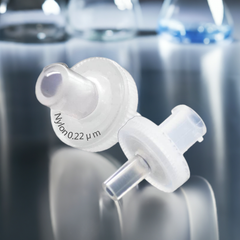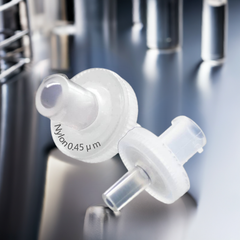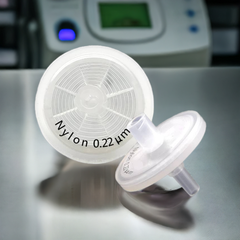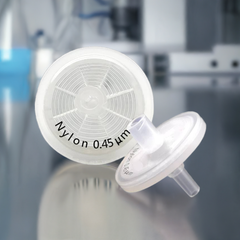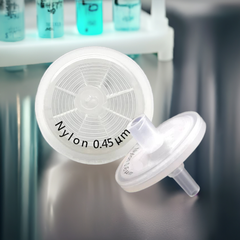Nylon Syringe Filters
6 productsNylon Syringe Filters: Reliable, Hydrophilic Filtration for Labs & Beyond
When you need fast, dependable filtration, nylon syringe filters are a go-to favorite. Natural water-loving (hydrophilic) membranes, robust chemical resistance, and compatibility with a wide range of solvents make these filters a staple in labs worldwide.
Here’s why your page—and your users—will love learning about nylon membrane syringe filter, sterile nylon syringe filters, and more.
What Makes Nylon Filters Unique?
Nylon (polyamide) membranes have several standout strengths:
- Hydrophilic out of the box—no need to pre-wet—making them superb for aqueous filtration.
- High mechanical and thermal tolerance, enduring up to ~410–482°F (210–250 °C).
- Chemical versatility, working well with water, alcohols, bases, and moderate organics
That means nylon filters
are ideal for HPLC prep, buffer sterilization, and general syringe filtration needs.
Hydrophilic & Protein-Friendly—but Know the Limitations
While nylon filters are great for aqueous and some organic samples, there are trade-offs:
- Protein binding can cause a slight loss of protein samples
- Chemical incompatibilities include strong acids (e.g., chloroform, methylene chloride
Bottom line: Nylon is excellent for polar solutions – think buffers, alcohols, bases – but skip them for aggressive solvents or precious protein samples.
Formats, Sizes & Sterility Options
Nylon syringe filters come in many convenient formats:
|
Feature |
Options & Notes |
|
Diameter |
13 mm, 25 mm, 30 mm variants |
|
Pore sizes |
0.1 µm – 5 µm; common lab sizes are 0.22 µm (sterile) and 0.45 µm (particulate) |
|
Sterility |
Bulk non‑sterile nylon filters (e.g., 100‑packs) and sterile nylon syringe filters, ideal for bioprocessing |
These options ensure compatibility whether you're preparing samples or sterilizing media.
Compatibility Guide: What Works & What Doesn’t
Use nylon filters confidently with:
- Aqueous buffers, water
- Alcohols, bases, mild organics
- Cell culture media, mobile phase prep for HPLC
But avoid nylon filters when handling:
- Strong acids (e.g., HCl, chloroform)
- Aggressive organics like chlorinated solvents
For those, consider PTFE or other compatible membranes instead.
Choosing the Right Nylon Filter: Size & Flow Matters
- 0.22 µm filters are ideal for maintaining sterility and removing fine particles.
- 0.45 µm filters offer faster flow and are suitable for routine preparation.
- Larger diameters (25 mm or 30 mm) increase flow rate and reduce clogging, making them ideal for prep volumes of up to 100 mL.
Need guidance? A syringe filtration size guide usually recommends:
- 13 mm for small sample prep (<10 mL)
- 25 mm for up to ~100 mL
-
30–33 mm for larger volumes (>100 mL)
Tips to Maximize Nylon Filter Performance
- Attach securely: Use the luer‑lock inlet for a leak-free seal
- Prime the filter: Push a few drops of your solvent through first
- Discard initial eluent: Ensures accurate filtrate for analytical procedures
- Prefilter turbid samples: Use larger pore or glass-fiber upstream filters to avoid clogging
- Sterile technique for sterile filters: Handle under clean conditions and discard after use
Real-World Use Cases
Nylon syringe filters are the Swiss Army knives of lab filtration:
- HPLC/GC sample prep – remove particulates, protect expensive columns
- Media sterilization – prepare buffer or media in sterile conditions
- Alcohol/aqueous solution filtration – perfect for cocktail solvent blends
- Industrial and food/beverage – versatile in cleaning and processing tasks
From academic laboratories to industrial plants, nylon filters deliver consistent and reliable results.
Frequently Asked Questions (FAQ)
What is a nylon membrane syringe filter?
A syringe filter with a nylon (polyamide) membrane—hydrophilic, rugged, and good for aqueous/organic borne particles.
Can nylon filters be autoclaved?
Yes—many can withstand up to ~121 °C (4 bar), though housing may limit temperature resistance.
Are nylon filters compatible with pH extremes?
They handle neutral to basic samples (pH 3–14) but degrade under strong acids.
Do nylon filters bind proteins?
Somewhat. They has mild protein binding. Choose CA/PES if sample retention is critical.
Sterile vs. non‑sterile—what's best?
Use sterile nylon syringe filters for tissue cultures or injections. Non‑sterile is fine for routine prep.
What pore size should I use?
Choose 0.22 μm for sterility or 0.45 μm for general particulate filtration.
Why Nylon Syringe Filters Stand Out
- Instantly hydrophilic—no pre-wetting needed
- Robust chemistry & temperature range
- Multiple sizes & pores align with lab needs
- Fast flow rates save time in prep work
- Low extractables protect sensitive assays
- Widely stocked by major filter brands

